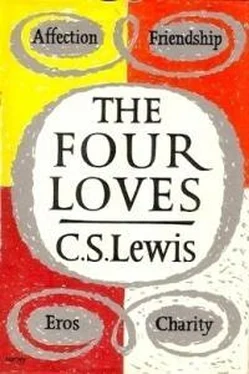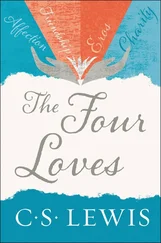When the two people who thus discover that they are on the same secret road are of different sexes, the friendship which arises between them will very easily pass—may pass in the first half–hour—into erotic love. Indeed, unless they are physically repulsive to each other or unless one or both already loves elsewhere, it is almost certain to do so sooner or later. And conversely, erotic love may lead to Friendship between the lovers. But this, so far from obliterating the distinction between the two loves, puts it in a clearer light. If one who was first, in the deep and full sense, your Friend, is then gradually or suddenly revealed as also your lover you will certainly not want to share the Beloved's erotic love with any third. But you will have no jealousy at all about sharing the Friendship. Nothing so enriches an erotic love as the discovery that the Beloved can deeply, truly and spontaneously enter into Friendship with the Friends you already had: to feel that not only are we two united by erotic love but we three or four or five are all travellers on the same quest, have all a common vision.
The co–existence of Friendship and Eros may also help some moderns to realise that Friendship is in reality a love, and even as great a love as Eros. Suppose you are fortunate enough to have "fallen in love with" and married your Friend. And now suppose it possible that you were offered the choice of two futures: " Either you two will cease to be lovers but remain forever joint seekers of the same God, the same beauty, the same truth, or else , losing all that, you will retain as long as you live the raptures and ardours, all the wonder and the wild desire of Eros. Choose which you please." Which should we choose? Which choice should we not regret after we had made it?
I have stressed the "unnecessary" character of Friendship, and this of course requires more justification than I have yet given it.
It could be argued that Friendships are of practical value to the Community. Every civilised religion began in a small group of friends. Mathematics effectively began when a few Greek friends got together to talk about numbers and lines and angles. What is now the Royal Society was originally a few gentlemen meeting in their spare time to discuss things which they (and not many others) had a fancy for. What we now call "the Romantic Movement" once was Mr. Wordsworth and Mr. Coleridge talking incessantly (at least Mr. Coleridge was) about a secret vision of their own. Communism, Tractarianism, Methodism, the movement against slavery, the Reformation, the Renaissance, might perhaps be said, without much exaggeration, to have begun in the same way.
There is something in this. But nearly every reader would probably think some of these movements good for society and some bad. The whole list, if accepted, would tend to show, at best, that Friendship is both a possible benefactor and a possible danger to the community. And even as a benefactor it would have, not so much survival value, as what we may call "civilisation–value"; would be something (in Aristotelian phrase) which helps the community not to live but to live well. Survival value and civilisation value coincide at some periods and in some circumstances, but not in all. What at any rate seems certain is that when Friendship bears fruit which the community can use it has to do so accidentally, as a by–product. Religions devised for a social purpose, like Roman emperor–worship or modern attempts to "sell" Christianity as a means of "saving civilisation", do not come to much. The little knots of Friends who turn their backs on the "World" are those who really transform it. Egyptian and Babylonian Mathematics were practical and social, pursued in the service of Agriculture and Magic. But the free Greek Mathematics, pursued by Friends as a leisure occupation, have mattered to us more.
Others again would say that Friendship is extremely useful, perhaps necessary for survival, to the individual. They could produce plenty of authority: "bare is back without brother behind it" and "there is a friend that sticketh closer than a brother". But when we speak thus we are using friend to mean "ally". In ordinary usage friend means, or should mean, more than that. A Friend will, to be sure, prove himself to be also an ally when alliance becomes necessary; will lend or give when we are in need, nurse us in sickness, stand up for us among our enemies, do what he can for our widows and orphans. But such good offices are not the stuff of Friendship. The occasions for them are almost interruptions. They are in one way relevant to it, in another not. Relevant, because you would be a false friend if you would not do them when the need arose; irrelevant, because the role of benefactor always remains accidental, even a little alien, to that of Friend. It is almost embarrassing. For Friendship is utterly free from Affection's need to be needed. We are sorry that any gift or loan or night–watching should have been necessary—and now, for heaven's sake, let us forget all about it and go back to the things we really want to do or talk of together. Even gratitude is no enrichment to this love. The stereotyped "Don't mention it" here expresses what we really feel. The mark of perfect Friendship is not that help will be given when the pinch comes (of course it will) but that, having been given, it makes no difference at all. It was a distraction, an anomaly. It was a horrible waste of the time, always too short, that we had together. Perhaps we had only a couple of hours in which to talk and, God bless us, twenty minutes of it has had to be devoted to affairs !
For of course we do not want to know our Friend's affairs at all. Friendship, unlike Eros, is uninquisitive. You become a man's Friend without knowing or caring whether he is married or single or how he earns his living. What have all these "unconcerning things, matters of fact" to do with the real question, Do you see the same truth? In a circle of true Friends each man is simply what he is: stands for nothing but himself. No one cares twopence about any one else's family, profession, class, income, race, or previous history. Of course you will get to know about most of these in the end. But casually. They will come out bit by bit, to furnish an illustration or an analogy, to serve as pegs for an anecdote; never for their own sake. That is the kingliness of Friendship. We meet like sovereign princes of independent states, abroad, on neutral ground, freed from our contexts. This love (essentially) ignores not only our physical bodies but that whole embodiment which consists of our family, job, past and connections. At home, besides being Peter or Jane, we also bear a general character; husband or wife, brother or sister, chief, colleague or subordinate. Not among our Friends. It is an affair of disentangled, or stripped, minds. Eros will have naked bodies; Friendship naked personalities.
Hence (if you will not misunderstand me) the exquisite arbitrariness and irresponsibility of this love. I have no duty to be anyone's Friend and no man in the world has a duty to be mine. No claims, no shadow of necessity. Friendship is unnecessary, like philosophy, like art, like the universe itself (for God did not need to create). It has no survival value; rather it is one of those things which give value to survival.
When I spoke of Friends as side by side or shoulder to shoulder I was pointing a necessary contrast between their posture and that of the lovers whom we picture face to face. Beyond that contrast I do not want the image pressed. The common quest or vision which unites Friends does not absorb them in such a way that they remain ignorant or oblivious of one another. On the contrary it is the very medium in which their mutual love and knowledge exist. One knows nobody so well as one's "fellow". Every step of the common journey tests his metal; and the tests are tests we fully understand because we are undergoing them ourselves. Hence, as he rings true time after time, our reliance, our respect and our admiration blossom into an Appreciative Love of a singularly robust and well–informed kind. If, at the outset, we had attended more to him and less to the thing our Friendship is "about", we should not have come to know or love him so well. You will not find the warrior, the poet, the philosopher or the Christian by staring in his eyes as if he were your mistress: better fight beside him, read with him, argue with him, pray with him.
Читать дальше











